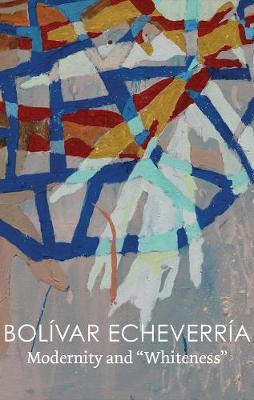Modernity and Whiteness

Modernity and Whiteness
For Echeverria, capitalism and modernity do not coincide: modernity is a long-term historical phenomenon that involved a new set of relations between human beings and nature and between the individual and the collective, while capitalism is a particular form in which modernity has been realized. As Marx showed, capitalism is a mode of reproduction that involves the growing commodification of social life - everything, even human labor power itself, is turned into a commodity. Echeverria introduces the notion of blanquitud or "whiteness" to capture the new form of identity that is brought into being by the totalizing and homogenizing character of capitalism. While blanquitud includes certain ethnic features, it is not so much an ethnic category as an ethical and cultural one, referring to a type of human being, homo capitalisticus, which threatens to spread throughout the world, overcoming and integrating identities that might otherwise resist it. But capitalism is not the only form of modernity - there are alternative modernities. In the final part of the book Echeverria explores the baroque as a characteristic of Latin American identity and sees it as a way of theatricalizing and transforming reality that takes some distance from Eurocentric paradigms and resists the homogenizing forces of capitalism.
Echeverria's analysis of the dynamics of capitalism and modernity represents one of the most important contributions to critical theory from a Latin American perspective. It will be of great interest to students and scholars of critical theory and postcolonial theory and anyone concerned with the global impact of capitalism on social and cultural life.
PRP: 148.18 Lei
Acesta este Pretul Recomandat de Producator. Pretul de vanzare al produsului este afisat mai jos.
133.36Lei
133.36Lei
148.18 LeiIndisponibil
Descrierea produsului
For Echeverria, capitalism and modernity do not coincide: modernity is a long-term historical phenomenon that involved a new set of relations between human beings and nature and between the individual and the collective, while capitalism is a particular form in which modernity has been realized. As Marx showed, capitalism is a mode of reproduction that involves the growing commodification of social life - everything, even human labor power itself, is turned into a commodity. Echeverria introduces the notion of blanquitud or "whiteness" to capture the new form of identity that is brought into being by the totalizing and homogenizing character of capitalism. While blanquitud includes certain ethnic features, it is not so much an ethnic category as an ethical and cultural one, referring to a type of human being, homo capitalisticus, which threatens to spread throughout the world, overcoming and integrating identities that might otherwise resist it. But capitalism is not the only form of modernity - there are alternative modernities. In the final part of the book Echeverria explores the baroque as a characteristic of Latin American identity and sees it as a way of theatricalizing and transforming reality that takes some distance from Eurocentric paradigms and resists the homogenizing forces of capitalism.
Echeverria's analysis of the dynamics of capitalism and modernity represents one of the most important contributions to critical theory from a Latin American perspective. It will be of great interest to students and scholars of critical theory and postcolonial theory and anyone concerned with the global impact of capitalism on social and cultural life.
Detaliile produsului








